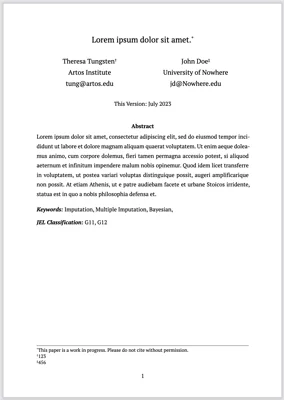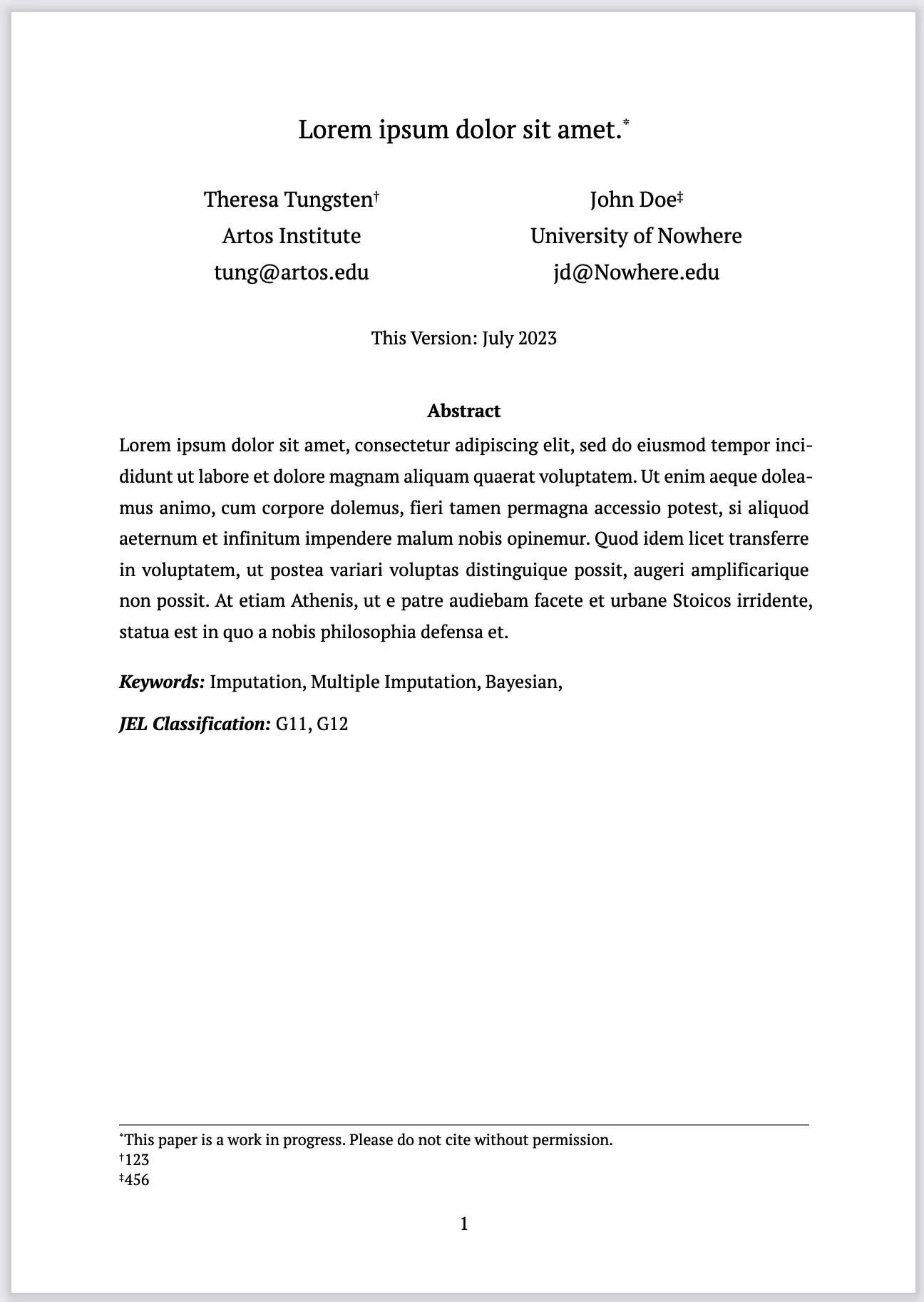Following the official tutorial, I create a single-column paper template for general use. You can use it for papers published on SSRN etc.
How to use
Use as a template package
Typst integrated the template with their official package manager. You can use it as the other third-party packages.
You only need to enter the following command in the terminal to initialize the template.
typst init @preview/ssrn-scribe
It will generate a subfolder ssrn-scribe including the main.typ and extra.typ files in the current directory with the latest version of the template.
Warning
Before version 0.6.0, this template has integrated with some other packages for a wide range of use. However, to make the template more flexible, all integrated packages are removed.
All the integrated packages have been saved in the extra.typ file and they have been imported to the main.typ file.
If you do not want to use them, you can comment out the import statement in the main.typ file.
#import "extra.typ": *
#show: great-theorems-init
Mannully use
- Download the template or clone the repository.
- generate your bibliography file using
.biblatexand store the file in the same directory of the template. - modify the
main.typfile in the subfolder/templateand compile it. Note: You should havepaper_template.typ,main.typandextra.typin the same directory.
In the template, you can modify the following parameters:
maketitle is a boolean (compulsory). If maketitle=true, the template will generate a new page for the title. Otherwise, the title will be shown on the first page.
maketitle=true:
| Parameter | Default | Optional | Description |
|---|---|---|---|
font |
“PT Serif” | Yes | The font of the paper. You can choose “Times New Roman” or “Palatino” |
fontsize |
11pt | Yes | The font size of the paper. You can choose 10pt or 12pt |
title |
“Title” | No | The title of the paper |
subtitle |
none | Yes | The subtitle of the paper, use “” or [] |
authors |
none | No | The authors of the paper |
date |
none | Yes | The date of the paper |
abstract |
none | Yes | The abstract of the paper |
keywords |
none | Yes | The keywords of the paper |
JEL |
none | Yes | The JEL codes of the paper |
acknowledgments |
none | Yes | The acknowledgment of the paper |
bibliography |
none | Yes | The bibliography of the paper bibliography: bibliography("bib.bib", title: "References", style: "apa") |
Additional layout controls (all optional):
author-columns,author-alignment(both modes): enforce a fixed column count and per-column alignment for the author grid (defaults auto-detect reasonable settings).cover-title-size,cover-subtitle-size,cover-author-name-size(maketitle=true only): change the typography of the cover title block directly from thepaper.withcall.cover-spacing(maketitle=true only): main vertical spacing unit between stacked elements (title → subtitle → authors → meta).cover-author-gutter,cover-author-row-gap(maketitle=true only): adjust horizontal and vertical spacing between author blocks on the cover.cover-text-width,cover-line-leading,cover-paragraph-spacing(maketitle=true only): control the width, line height, and paragraph spacing of the abstract/keywords/JEL block.frontmatter-gap(both modes): extra spacing between abstract, keywords, and JEL sections.inline-title-size,inline-subtitle-size,inline-author-name-size(maketitle=false only): mirror the cover typography when the title stays on the first page.inline-author-gutter,inline-author-row-gap(maketitle=false only): tweak spacing for inline author lists.body-line-leading,body-paragraph-spacing,body-text-spacing(both modes): fine-tune the main text’s readability globally.
Author notes and acknowledgments on the cover are rendered as left-aligned footnotes with consistent marker spacing.
Full configuration example with inline comments:
#import "@preview/ssrn-scribe:0.9.1": *
#show: paper.with(
// Core typography (applies to body in both modes)
font: "PT Serif", // main document font family
fontsize: 11pt, // main document font size
body-text-spacing: 106%, // character width spacing in main text
body-line-leading: 1.32em, // line height in the main text
body-paragraph-spacing: 0.7em, // space between paragraphs in main text
// Title-page switch
maketitle: true, // true → dedicated cover page, false → inline title
// Metadata & title block
title: [Your Title Here], // document title
subtitle: "Optional subtitle", // optional subtitle
date: "February 2025", // version/date line
acknowledgments: "Funding note.", // rendered as a footnote on the title
// Cover-page only styling (ignored when maketitle=false)
cover-title-size: 20pt, // cover title font size
cover-subtitle-size: 13pt, // cover subtitle font size
cover-spacing: 24pt, // vertical space between cover sections
cover-text-width: 90%, // width of abstract/keywords block on the cover
cover-line-leading: 1.32em, // line height for cover/front matter paragraphs
cover-paragraph-spacing: 0.7em, // spacing between cover paragraphs
cover-author-name-size: 14pt, // author name size on the cover
cover-author-gutter: 24pt, // horizontal gap between cover author columns
cover-author-row-gap: 16pt, // vertical gap between cover author rows
// Inline-title styling (used only when maketitle=false)
inline-title-size: 18pt, // inline title size
inline-subtitle-size: 12pt, // inline subtitle size
inline-author-name-size: 12pt, // inline author name size
inline-author-gutter: 18pt, // horizontal gap between inline author columns
inline-author-row-gap: 12pt, // vertical gap between inline author rows
// Author block layout (applies to both modes)
author-columns: 2, // force two columns; omit to auto-detect
author-alignment: center, // column alignment for author details
authors: (
(
name: "Author One",
affiliation: "Affiliation One",
email: "author.one@example.com",
note: "Contact author",
),
(
name: "Author Two",
affiliation: "Affiliation Two",
email: "author.two@example.com",
),
),
// Front matter (rendered on cover or inline depending on maketitle)
abstract: [Summarize your contribution here.], // optional abstract content
keywords: [Keyword 1, Keyword 2, Keyword 3], // keyword list
JEL: [G11, G12], // optional JEL codes
frontmatter-gap: 12pt, // gap between abstract/keywords/JEL
// bibliography: bibliography("bib.bib", title: "References", style: "apa"),
)
When you attach paper.with(...) via #show: paper.with(...), Typst passes the remaining document content (doc) automatically, so no additional argument is required at the end of the call.
maketitle=false:
| Parameter | Default | Optional | Description |
|---|---|---|---|
font |
“PT Serif” | Yes | The font of the paper. You can choose “Times New Roman” or “Palatino” |
fontsize |
11pt | Yes | The font size of the paper. You can choose 10pt or 12pt |
title |
“Title” | No | The title of the paper |
subtitle |
none | Yes | The subtitle of the paper, use “” or [] |
authors |
none | No | The authors of the paper |
date |
none | Yes | The date of the paper |
bibliography |
none | Yes | The bibliography of the paper bibliography: bibliography("bib.bib", title: "References", style: "apa") |
Note: You need to keep the comma at the end of the first bracket of the author’s list, even if you have only one author.
(
name: "",
affiliation: "", // optional
email: "", // optional
note: "", // optional
),
#import "@preview/ssrn-scribe:0.9.1": *
#show: paper.with(
font: "PT Serif", // "Times New Roman"
fontsize: 12pt, // 12pt
maketitle: true, // whether to add new page for title
title: [#lorem(5)], // title
subtitle: "A work in progress", // subtitle
authors: (
(
name: "Theresa Tungsten",
affiliation: "Artos Institute",
email: "tung@artos.edu",
note: "123",
),
),
date: "July 2023",
abstract: lorem(80), // replace lorem(80) with [ Your abstract here. ]
keywords: [
Imputation,
Multiple Imputation,
Bayesian,],
JEL: [G11, G12],
acknowledgments: "This paper is a work in progress. Please do not cite without permission.",
// bibliography: bibliography("bib.bib", title: "References", style: "apa"),
)
= Introduction
#lorem(50)
Preview
Example
Here is a screenshot of the template:

Example-brief with maketitle=true

Example-brief with maketitle=false


